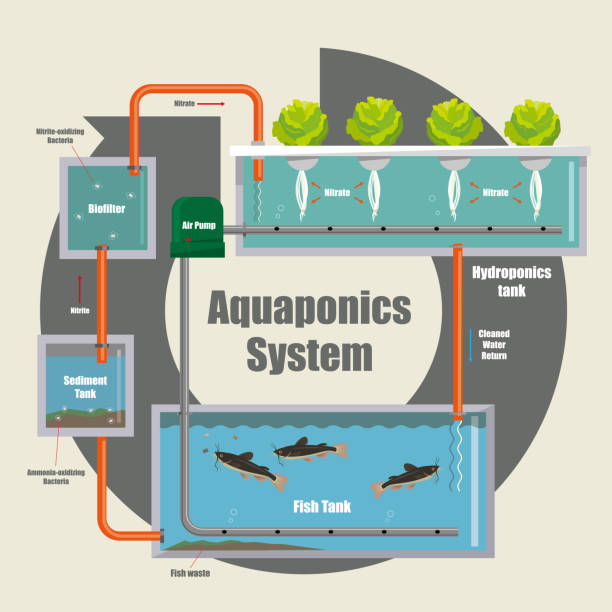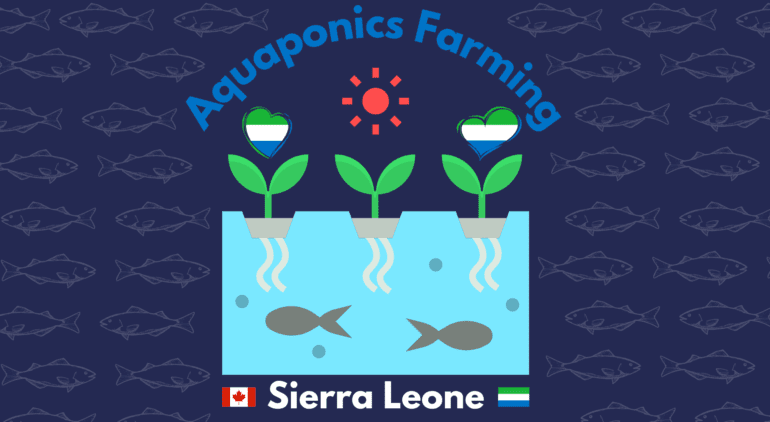The project aims to empower women and young smallholder farmers in Sierra Leone through innovative aquaponic and hydroponic farming techniques. By constructing an aquaponics fish farm with an integrated hydroponic vegetable garden, the project will provide sustainable income-generating opportunities and improve access to nutritional foods.
Project Summary
The project aims to empower women and young smallholder farmers in Sierra Leone through innovative aquaponic and hydroponic farming techniques. By constructing an aquaponics fish farm with an integrated hydroponic vegetable garden, the project will provide sustainable income-generating opportunities and improve access to nutritional foods. A cooperative of women and youth will be trained in aquaponic farming to secure a stable source of income. This closed-loop system maximizes resource utilization by using fish waste to nourish the vegetable garden and filtering water for the fish. This approach minimizes resource waste and environmental impact, making it a sustainable solution for improving livelihoods and food security in Sierra Leone.
About this Project
The project will introduce women and young smallholder farmers to innovative farming techniques using aquaponic and hydroponic technology for Fish-Vegetable farming which requires less land and water utilization. This innovative project will construct a solar-powered aquaponics fish farm with an integrated hydroponic vegetable garden in western area rural, Sierra Leone with the overarching goal of providing sustainable income-generating opportunities and improving access to nutritional foods. A cooperative of women and youth will be formed and trained in aquaponic/hydroponic farming helping them secure a stable source of income. By combining fish and vegetable production, we will create a closed-loop system that maximizes resource utilization. The fish waste nourishes the hydroponic vegetable garden, while the vegetables filter the water for the fish. This synergy reduces resource waste and environmental impact, making it a sustainable solution. Market linkages will be established to provide on-demand produce to restaurants and school feeding programs.
Objectives:
• Empower women and youth by providing training in aquaponic and hydroponic farming techniques.
• Create sustainable income-generating opportunities for women and youth through participation in aquaponic and hydroponic farming activities.
• Improve access to nutritional foods for project participants and their communities.
• Foster environmental sustainability through the adoption of resource-efficient farming practices.
Activities:
• Construction of aquaponics fish farm and hydroponic vegetable garden.
• Training sessions on aquaponic and hydroponic farming techniques for women and youth.
• Formation and training of a cooperative of women and youth in aquaponic farming.
• Maintenance and operation of the aquaponic and hydroponic systems.
Expected Outcomes:
• Increased income generation opportunities for women and youth.
• Improved access to nutritional foods for project participants and their families.
• Enhanced environmental sustainability through resource-efficient farming practices.
• Strengthened capacity of women and youth in aquaponic and hydroponic farming techniques.
Project Background
Sierra Leone, a West African nation, faces significant challenges related to food security, economic development, and gender equality. According to an August 2022 Food Security Monitoring System analysis, 81% of Sierra Leonean households were unable to meet their basic food and nutrition needs. 15% were severely food insecure and needed emergency food assistance (WFP). Yvonne Forsén, WFP’s Country Representative, highlighted that Sierra Leone imports a large quantity of its food, and with the global food and fuel crisis compounded by the conflict in Ukraine, poor households have been affected. Smallholder farmers, especially women, are among the worst affected by the continued increases in food prices, leading to extreme levels of food insecurity. Although the agricultural sector employs approximately 65% of the country’s labour force, of which about 75% are predominantly women, the demand for food outweighs cultivation efforts. Agricultural yield is severely affected due to poor crop management, post-harvest losses, inappropriate storage, and market linkages. Severe weather events like flooding and rising temperatures disproportionately affect many Sierra Leonean fishing and farming communities.
In response to these challenges, there is a growing recognition of the potential of aquaponic farming as a sustainable solution. Aquaponics is an innovative, sustainable food production system that integrates aquaculture with hydroponic vegetable crops. It offers several advantages, including efficient use of resources, higher yields in smaller spaces, and minimal environmental impact. Aquaponics has a key role to play in food provision and tackling global challenges such as water scarcity, food security, urbanization, and reductions in energy use and food miles.
The proposed project seeks to leverage aquaponic farming to empower women in Sierra Leone. By providing training, resources, and support, the project aims to equip women with the skills and tools they need to engage in sustainable agriculture, improve household income, and contribute to food security in their communities. Additionally, by promoting gender equality and women's leadership, the project aims to address broader social and economic inequalities in Sierra Leone.
Your goal for the year described, how you intend on spending your goal amount.
1. Construction and Setup: Funding will be allocated towards the construction and setup of the aquaponic farming infrastructure, including fish tanks, hydroponic beds, filtration systems, and necessary facilities.
2. Training and Capacity Building: Funds will be allocated for conducting training workshops and capacity-building sessions for women participants. This includes training in aquaponic farming techniques, business management, marketing strategies, and cooperative formation.
3. Operational Expenses: Operational expenses, such as utilities, maintenance costs, and ongoing technical support, will be covered by the funding. This ensures the continuous operation and management of the aquaponic farm after its establishment.
4. Materials and Supplies: Funds will be used to procure materials and supplies essential for aquaponic farming, including fish stock, seeds, nutrient solutions, growing media, and equipment required for farm operations.
5. Monitoring and Evaluation: A portion of the funding will be allocated towards monitoring and evaluation activities to track project progress, assess outcomes, and measure impact. This ensures accountability and informs decision-making throughout the project lifecycle.
6. Administrative and Overhead Costs: Administrative and overhead costs, including staff stipend and communication costs, will be covered by the funding to support project management and coordination.

About Peter Nyande
Peter Nyande is a dynamic and driven social entrepreneur dedicated to leveraging business expertise for social impact. With a Bachelor of Arts in International Development/Economics from the University of Toronto, Peter has cultivated a multifaceted skill set grounded in sustainable development principles. His journey into international development began with a Canadian International Development Agency (CIDA) internship with the YMCA of Simcoe/Muskoka, igniting his passion for creating positive change. Peter has since honed his expertise through diverse professional experiences, spanning roles within federal, provincial, and municipal governments, as well as non-profit organizations.


